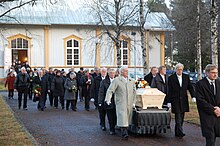
Back مشكلة الاستقراء Arabic Problema de la inducció Catalan Problém indukce Czech Induktionsproblemet Danish Induktionsproblem German Problema de la inducción Spanish Induktsiooniprobleem Estonian Indukzioaren arazoa Basque مسئله استقراء Persian Induktion ongelma Finnish


| Part of a series on |
| Epistemology |
|---|
The problem of induction is a philosophical problem that questions the rationality of predictions about unobserved things based on previous observations. These inferences from the observed to the unobserved are known as "inductive inferences". David Hume, who first formulated the problem in 1739,[1] argued that there is no non-circular way to justify inductive inferences, while he acknowledged that everyone does and must make such inferences.[2]
The traditional inductivist view is that all claimed empirical laws, either in everyday life or through the scientific method, can be justified through some form of reasoning. The problem is that many philosophers tried to find such a justification but their proposals were not accepted by others. Identifying the inductivist view as the scientific view, C. D. Broad once said that induction is "the glory of science and the scandal of philosophy".[3] In contrast, Karl Popper's critical rationalism claimed that inductive justifications are never used in science and proposed instead that science is based on the procedure of conjecturing hypotheses, deductively calculating consequences, and then empirically attempting to falsify them.
- ^ Henderson, Leah (22 November 2022). Zalta, Edward N.; Nodelman, Uri (eds.). "The Problem of Induction". Stanford Encyclopedia of Philosophy.
- ^ Hume, David (January 2006). An Enquiry Concerning Human Understanding – via Gutenberg Press.#9662: Most recently updated in 16 October 2007
- ^ Gustavsson 2021, Note 16 in Sec. 7.